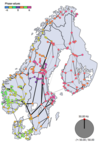The mathematics of tides
programme
Crédits
Contributeurs
Soutenu(e) par
Most people know something about what causes tides: if asked, almost everyone will say tides are caused by the moon. But if one delves a little deeper, it is easy to find many questions which arise naturally and are not so easy to answer. This interactive application tries to give an intuitive approach to some of the mathematics underlying tides, which is not so obvious for non specialists.
If we take the simple and common statement “tides are caused by the moon”, it is natural to investigate if it is consistent with physical observations, and what happens is that there are several apparent contraditions. For example, the moon only passes over each place once a day, but there are approximately two high tides a day (if we consider the hypothesis that the sun causes the tides, we also run into a similar problem). Also, tides are not always equally strong: they are stronger at the new moon and at the full moon, and while this makes sense for the new moon (since the sun and the moon are pulling the water in the same direction), it does not seem to make sense for the full moon (since the attraction of the sun and the moon are in opposite directions and could therefore be expected to cancel each other out, at least partially).
This presentation starts by considering a model which exhibits these apparent contradictions, the problem being that it does not take into account some important aspects. Then other models are discussed which consider these points and explain why the contradictions are only apparent and how things actually work.
Fichier principal
Répertoire
Plus de programmes
- ‹ précédent
- 5 sur 8
- suivant ›










